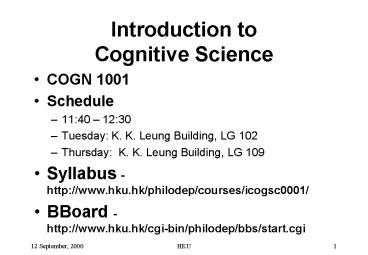Introduction to Cognitive Science - PowerPoint PPT Presentation
1 / 28
Title:
Introduction to Cognitive Science
Description:
Title: No Slide Title Author: A. H. Vera Last modified by: Alexander L. Francis Created Date: 9/9/1998 1:35:04 AM Document presentation format: A4 Paper – PowerPoint PPT presentation
Number of Views:126
Avg rating:3.0/5.0
Title: Introduction to Cognitive Science
1
Introduction to Cognitive Science
- COGN 1001
- Schedule
- 1140 1230
- Tuesday K. K. Leung Building, LG 102
- Thursday K. K. Leung Building, LG 109
- Syllabus - http//www.hku.hk/philodep/courses/icog
sc0001/ - BBoard -
http//www.hku.hk/cgi-bin/philodep/bbs/start.cgi
2
Lecturers
- Psychology - Dr A. Francis
- Computer Science - Dr. Q. Huo
- Linguistics - Dr. A. Bodomo
- Neuroscience - Dr. I. Bruce
- Philosophy - Dr. J. Lau
- Cognitive Science Centre Director
3
Tutorials
- Tutors
- Lo Lap Yan
- Savio Wong Wai Ho
- Grading
- 40 Coursework
- 25 Five Assignments
- 10 Tutorial Participation and Attendance
- 05 Attendance
- 60 Final Exam
CogSci Graduates
4
So, whats the course about, already!?!
- What do Cognitive Scientists study?
- Why?
- How?
5
What?
- Information in the brain
6
Basic Assumptions
- Information can be processed and stored
(remembered), retrieved, changed, communicated
and turned into action. - There are rules (logical or otherwise) by which
information is manipulated or processed.
7
Cognitive Science is a basic science
- Like chemistry, physics, or biology
- The activities of the nervous system can be
analysed at different levels - Psychological
- Computational
- Neurological
- All the levels are relevant and are not reducible
8
History
- It all starts with Philosophy (Decartes,
Mind/Body problem). - Post-behaviorist Psychology (Chomsky, Miller
Modern Linguistics) - Cognitive Neuropsychology (from Broca to fMRI)
- Computer Science (Turing, von Neuman, neural
computation)
9
Why?
- Brains do amazing things
10
A few things brains do
- Recognize people and things
- Reach out and pick up things
- Speak and understand language(s)
- Read and write
- Navigate the streets of Hong Kong
- Lecture on Cognitive Science
- Etc.
11
Why study these things?
- To help us better understand human behaviors.
- To help make our computers better at doing
human-like tasks.
12
Why not just study brains?
13
The brain is as complex as anything we know
- 12801380 grams
- 180 billion neurons
(80 billion involved in
information processing) - 1 trillion connections (1,000,000,000,000)
(some cells have up to 15,000 connections!) - at least 60 possible neurotransmitter chemicals
- dozens of different kinds of cells bushy, spiny,
stellate, basket chopper Purkinje, Golgi - nearly 100 functionally distinguishable areas
14
The relationship between anatomy or physiology
and behavior is very complex
15
- Studying brains (alone) might not tell us what we
want to know. - Like studying architecture or urban planning by
looking only at bricks! - We need to study behavior from many perspectives.
16
How?
- Thats the rest of the course!
17
The five major areas
Computer Science
Philosophy
COG SCI
Physiology
Linguistics
Psychology
18
Cognitive Psychology
- Information in the brain
- What is the physical structure of the nervous
system, and what is its role in human behavior?
- Perception
- Categorization
- Representation
- Memory
- Attention
- (Language)
- Learning
- Thought
19
Perception
20
(No Transcript)
21
Computer Science
- "Knowledge representation"
- What is AI?
- Semantic networks and frames
- Predicate logic
- Rule-based systems
22
Creatures created by Rodney Brookes at MIT
Partial semantic network for water
23
Linguistics
- What are the mental processes and representations
underlying language production and understanding? - Language Structure
- Phonology
- Morphology
- Syntax
- Semantics
- Pragmatics
- Literacy
24
University of California Perceptual Sciences
Laboratory (D. Massaro) http//mambo.ucsc.edu/
25
Physiology
- Horrifying complexity of connections among
neurons in the brain - Relatively simple interactions between neurons
- excitation inhibition
- Voyage through the visual system for the image of
a brown dog - Simple retinal processing to parallel processing
of form, colour, motion to object recognition - Limitations of the Neuroscience approach to
Cognition
26
EEG/ERP recording
MRI (axial)
fMRI (coronal)
27
Philosophy
- Two roles of Philosophy in Cognitive Science
- Role 1 baby science nursery
- "what you do to a problem until it can be solved
by science work with scientists to find the
best way to study a problem - many sciences developed out of philosophy
- Role 2 building inspector
- examines foundational assumptions and concepts
e.g. What are computations? What is
consciousness? What makes something a
representation?
28
(No Transcript)

